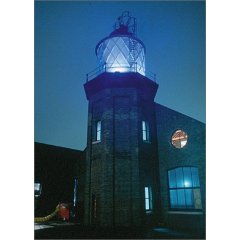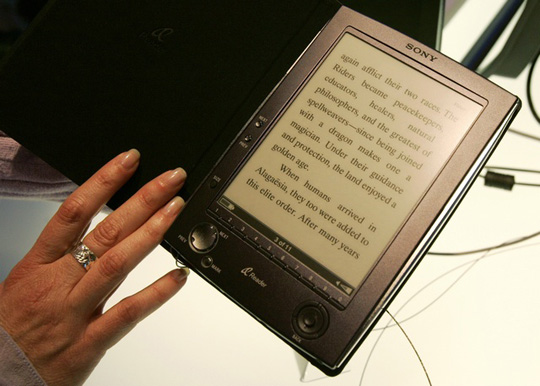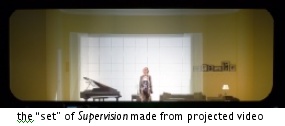(this is a follow-up to ben’s recent post “the book is reading you.”
i rarely read Maureen Dowd but the headline of her column in today’s New York Times, “Googling past the Graveyard,” caught my attention. Dowd calls Dick Cheney on the carpet for asking Google to release the search records of U.S. citizens. while i’m horrified that the govt. would even consider asking for such information, i’m concerned that the way this particular issue is playing out, Google is being portrayed as the poor beleaguered neutral entity caught between an over-reaching bureaucracy and its citizens. Cheney will expire eventually. in the meantime Google will collect even more data. Google is a very big corporation, who’s power will grow over time. in the long run, why aren’t people outraged that this information is in Google’s hands in the first place. shouldn’t we be?
Author Archives: bob stein
LONGPLAYER
when i was growing up they started issuing LP albums which played at 33 1/3 rpm, vastly increasing the amount of playing time on one side of a record. before the LP, audio was recorded and distributed on brittle discs made of shellac, running at 78rpm. 78s had a capacity of about 12 minutes; LPs upped that to about 30 minutes which made it possible for classical music fans to listen to an entire movement without changing discs and enabled  the development of the rock and roll album.
the development of the rock and roll album.
in 2,000 Jem Finer, a UK-based artist released Longplayer, a 1000-year musical composition that runs continuously and without repetition from its start on January 1, 2000 until its completion on December 31, 2999. Related conceptually to the Long Now project which seeks to build a ten-thousand year clock, Longplayer uses generative forms of music to make a piece that plays for ten to twelve human lifetimes. Longplayer challenges us to take a longer view which takes account of the generations that will come after us.
the longplayer also reminds me of an idea i’ve been intrigued by — the possiblity of (networked) books that never end because authors keep adding layers, tangents and new chapters.
Finer published a book about Longplayer which includes a vinyl disc (LP actually) with samples.
video ipod

Looks like it’s hardware day at if:book. Just got a video iPod. Hmmm. this looks like another niche where Apple has handily beat Sony. the image is crisper and larger than i expected; the case is slimmer and lighter.
it’s remarkably easy to convert video files to MP4 and load them onto the iPod. the experience is intimate . i’m experimenting with different genres, poetry, animation, family home video, short films. everything works. the iPod got handed around from ben to dan to ray to jesse. we came up with a bunch of ideas for projects we want to try. stay tuned.
first sighting of sony ebook reader
this is a late addition to this post. i just realized that whatever the strengths and weaknesses of the Sony ebook reader, i think that most of the people writing about it, including me, have missed perhaps the most important aspect — the device has Sony’s name on it. correct me if i’m wrong, but this is the first time a major consumer electronics company has seen fit to put their name on a ebook reader in the US market. it’s been a long time coming.
Reuters posted this image by Rick Wilking. every post i’ve seen so far is pessimistic about sony’s chances. i’m doubtful myself, but will wait to see what kind of digital rights management they’ve installed. if it’s easy to take

things off my desktop to read later, including pdfs and web pages, and if the MP3 player feature is any good they might be able to carve out a niche which they can expand over time if they keep developing the concept. i do wish it were a bit more stylish . . .
here’s a link to ben’s excellent post ipod for text.
new mission statement
the institute is a bit over a year old now. our understanding of what we’re doing has deepened considerably during the year, so we thought it was time for a serious re-statement of our goals. here’s a draft for a new mission statement. we’re confident that your input can make it better, so please send your ideas and criticisms.
OVERVIEW
The Institute for the Future of the Book is a project of the Annenberg Center for Communication at USC. Starting with the assumption that the locus of intellectual discourse is shifting from printed page to networked screen, the primary goal of the Institute is to explore, understand and hopefully influence this evolution.
THE BOOK
We use the word “book” metaphorically. For the past several hundred years, humans have used print to move big ideas across time and space for the purpose of carrying on conversations about important subjects. Radio, movies, TV emerged in the last century and now with the advent of computers we are combining media to forge new forms of expression. For now, we use “book” to convey the past, the present transformation, and a number of possible futures.
THE WORK & THE NETWORK
One major consequence of the shift to digital is the addition of graphical, audio, and video elements to the written word. More profound, however, are the consequences of the relocation of the book within the network. We are transforming books from bounded objects to documents that evolve over time, bringing about fundamental changes in our concepts of reading and writing, as well as the role of author and reader.
SHORT TERM/LONG TERM
The Institute values theory and practice equally. Part of our work involves doing what we can with the tools at hand (short term). Examples include last year’s Gates Memory Project or the new author’s thinking-out-loud blogging effort. Part of our work involves trying to build new tools and effecting industry wide change (medium term): see the Sophie Project and NextText. And a significant part of our work involves blue-sky thinking about what might be possible someday, somehow (long term). Our blog, if:book covers the full-range of our interests.
CREATING TOOLS
As part of the Mellon Foundation’s project to develop an open-source digital infrastructure for higher education, the Institute is building Sophie, a set of high-end tools for writing and reading rich media electronic documents. Our goal is to enable anyone to assemble complex, elegant, and robust documents without the necessity of mastering overly complicated applications or the help of programmers.
NEW FORMS, NEW PROCESSES
Academic institutes arose in the age of print, which informed the structure and rhythm of their work. The Institute for the Future of the Book was born in the digital era, and we seek to conduct our work in ways appropriate to the emerging modes of communication and rhythms of the networked world. Freed from the traditional print publishing cycles and hierarchies of authority, the Institute seeks to conduct its activities as much as possible in the open and in real time.
HUMANISM & TECHNOLOGY
Although we are excited about the potential of digital technologies to amplify human potential in wondrous ways, we believe it is crucial to consciously consider the social impact of the long-term changes to society afforded by new technologies.
BEYOND BORDERS
Although the institute is based in the U.S. we take the seriously the potential of the internet and digital media to transcend borders. We think it’s important to pay attention to developments all over the world, recognizing that the future of the book will likely be determined as much by Beijing, Buenos Aires, Cairo, Mumbai and Accra as by New York and Los Angeles.
if:book’s first year
I spent several hours last night and this morning looking over all the posts since we started if:book last december. It’s been a remarkably interesting experience working with my colleagues, exploring and defining the boundaries of our interests and effort. Here are a few posts i picked out for one reason or another. On monday we’ll post a new revised mission statement for the institute .
1. Three Books That Influenced Your Worldview: The List
we launched the site with the results of our first though experiment in which we asked people to name the three books that most influenced their world view. the results were very interesting. check out the exchange with Alan Kay too.
2. networked book/book as network
kim wrote this first if:book post which mentioned the concept of a “networked book” — a subject that we keep coming back to and find increasingly exciting.
3. genre-busting books
sol gaitan was our most frequent guest blogger. the breadth of her cultural knowledge and her constant reminder that the boundaries of our world extend beyond the hyper-connected coasts of the U.S. are a crucial and welcome contribution.
4. from the nouveau roman to the nouveau romance
one of a dozen or so long posts from Dan who took a seemingly obscure subject and wove it into a deliciously interesting discussion completely relevant to our effort to understand the shifting landscape of intellectual discourse. a more recent one
5. contagious media: symptom of what’s to come?
first time we experimented with making our work open and transparent. this idea grew over time and is now in the draft of our new mission statement which says, Academic institutes arose in the age of print, which informed the structure and rhythm of their work. The Institute for the Future of the Book was born in the digital era, and we seek to conduct our work in ways appropriate to the emerging modes of communication and rhythms of the networked world. Freed from the traditional print publishing cycles and hierarchies of authority, the Institute seeks to conduct its activities as much as possible in the open and in real time.
6. ted nelson & the ideologies of documents
a brilliant post by Dan about the importance of (much-maligned visionary) Ted Nelson’s views on the way we choose to structure and represent knowledge.
7. it seems to be happening before our eyes, Pt 1 and Pt2
2005 is likely to be remembered as the year that we started to pay more attention to individual voices in the blogosphere than the mainstream media. The NY Times and Washington Post may never recover from the exposures that showed they were in cahoots with the Bush administration over Plamegate and the admission of wholesale unauthorized wire-tapping.
8. blog reading: what’s left behind
dan wrote this post about the deficiencies of the structure of blogs. it’s a recurring theme at the institute and you’ll see a lot more about it in the coming year.
9. transliteracies: research in the technological, social, & cultural practices of online reading
ben re-posted this interesting discussion by Alan Liu on the changing nature of reading and browsing in an online context.
10. flushing the net down the tubes
ben’s first post on the crucial subject of the coming battle in which the telcos and cable companies will try to turn the web into a broadcast medium favoring the big media companies over individual voices.
11. sober thoughts on google: privatization and privacy
thanks to ben’s thougtful posts, the institute has gained a reputation for developing an even-handed view of Google book scanning and searching project.
12. the “talk to me” crew talks with the institute
now that we’ve got our cool new offices in williamsburg (brooklyn), we’ve been inviting an interesting group of folks to lunch. Liz and Bill were two of our favorite visitors, written up in a nice post by Ray. Other interesting visitors were Ken Wark, Tom De Zengotita and Mitchelll Stephens.
13. the future of the book: korea, 13th century
couldn’t resist including ben’s write-up to a buddhist monastery in korea — both because it has the most beautiful photo that appeared in the blog and for one of my favorite images . . . the whole monastery a kind of computer, the monks running routines to and from the database.
Wikipedia to consider advertising
The London Times just published an interview with Wikipedia founder Jimmy Wales in which he entertains the  idea of carrying ads. This mention is likely to generate an avalanche of discussion about the commercialization of open-source resources. While i would love to see Wikipedia stay out of the commercial realm, it’s just not likely. Yahoo, Google and other big companies are going to commercialize Wikipedia anyway so taking ads is likely to end up a no-brainer. As i mentioned in my comment on Lisa’s earlier post, this is going to happen as long as the overall context is defined by capitalist relations. Presuming that the web can be developed in a cooperative, non-capitalist way without fierce competition and push-back from the corporations who control the web’s infrastructure seems naive to me.
idea of carrying ads. This mention is likely to generate an avalanche of discussion about the commercialization of open-source resources. While i would love to see Wikipedia stay out of the commercial realm, it’s just not likely. Yahoo, Google and other big companies are going to commercialize Wikipedia anyway so taking ads is likely to end up a no-brainer. As i mentioned in my comment on Lisa’s earlier post, this is going to happen as long as the overall context is defined by capitalist relations. Presuming that the web can be developed in a cooperative, non-capitalist way without fierce competition and push-back from the corporations who control the web’s infrastructure seems naive to me.
defending the creative commons license
interesting question came up today in the office. there’s a site, surferdiary.com, that reposts every entry on if:book. they do the same for several other sites, presumably as a way to generate traffic to their site and ultimately to gather clicks on their google supplied ads. if:book entries are posted with a creative commons license which allows reuse with proper attribution but forbids commercial use. surferdiary’s use seems to be thoroughly commercial. some of my colleagues think we should go after them as a way of defending the creative commons concept. would love to know what people think?
ElectraPress
Kathleen Fitzpatrick has put forth a very exciting proposal calling for the formation of an electronic academic press. Recognizing the crisis in academic publishing, particularly with the humanities, Fitzpatrick argues that:
The choice that we in the humanities are left with is to remain tethered to a dying system or to move forward into a mode of publishing and distribution that will remain economically and intellectually supportable into the future.
i’ve got my fingers crossed that Kathleen and her future colleagues have the courage to go way beyond PDF and print-on-demand; the more Electrapress embraces new forms of born-digital documents especially in an open-access pubishing environment, the more interesting the new enterprise will be.
are we real or are we memorex
i saw four live performances and a dozen gallery shows over the past few days; one theme kept coming up– what is the relationship of simulated reality to reality. here are some highlights and weekend musings.
thursday night: “Supervision,” a play by the Builders Association and DBox about  the infosphere which seems to know more about us than we do — among other things “it” never forgets and rarely plays mash-up with our memories the way human brains are wont to do. the play didn’t shed much light on what we could or should do about the encroaching infosphere but there was one amazing moment when video started shooting from left to right across the blank wall behind the actors. within moments a complete set was “constructed” out of video projections — so seamlessy joined at the edges and so perfectly shot for the purpse that you quickly forgot you were looking at video.
the infosphere which seems to know more about us than we do — among other things “it” never forgets and rarely plays mash-up with our memories the way human brains are wont to do. the play didn’t shed much light on what we could or should do about the encroaching infosphere but there was one amazing moment when video started shooting from left to right across the blank wall behind the actors. within moments a complete set was “constructed” out of video projections — so seamlessy joined at the edges and so perfectly shot for the purpse that you quickly forgot you were looking at video.
friday night: Nu Voices six guys making amazing house music, including digitized-sounding vocals, entirely with their voices. one of the group, Masai Electro, eerily imitated the sounds laurie anderson makes with her vocoder or that DJs make when they process vocals to sound robotic. the crowd loved it which made me wonder why we are so excited about hearing a human pretend to be a machine? i asked masai electro why he thinks the audience likes what he does so much. he had never been asked the question before and evidently hadn’t thought about it, but then spontaneously answered “because that’s where we’re going” meaning that humans are becoming machines or at least are becoming “at one” with them.
saturday afternoon: Clifford Ross’ very large landscapes (13′ x 6′) made with a super high resolution surveillance camera. a modern attempt at hudson river school lush landscapes. because of the their size and detail, you feel as if you are looking out a window at reality; makes you long for the “natural world” most of us rarely encounter.

left with a bunch of questions
does it make a difference if our experience is “real” or “simulated.” does that way of looking at things even make sense anymore. when we manage to add the smell of fresh air, the sound of the wind, the rustle of the grass, the bird in flight and the ability to walk around in life-size 3-D spaces to the clifford ross photos, what will be the meaningful difference between walking in the countryside and opening the latest “you are there” coffee table book of the future. in a world with limited resources i can see the value of subsituting vicarious travel for the real thing (after all if all 7 billion of us traipsed out to the galapagos during our lifetimes, the “original” would be overrun and despoiled, turning it into its opposite). but what does it mean if almost all of our experience is technologically simulated and/or mediated?
Pedro Meyer in his comment about digitally altered photos says that all images are subjective which makes altered/not-altered a moot distinction. up until now the boundary between mediated objects and “reality” was pretty obvious, but i wonder if that changes when the scale is life-like and 3D. the Ross photos and the DBox video projections foreshadow life-size media which involves all the senses. the book of the future may not be something we hold in our hands, it might be something a 3-dimensional space we can inhabit. does it make any difference if i’m interacting only with simulacra?
